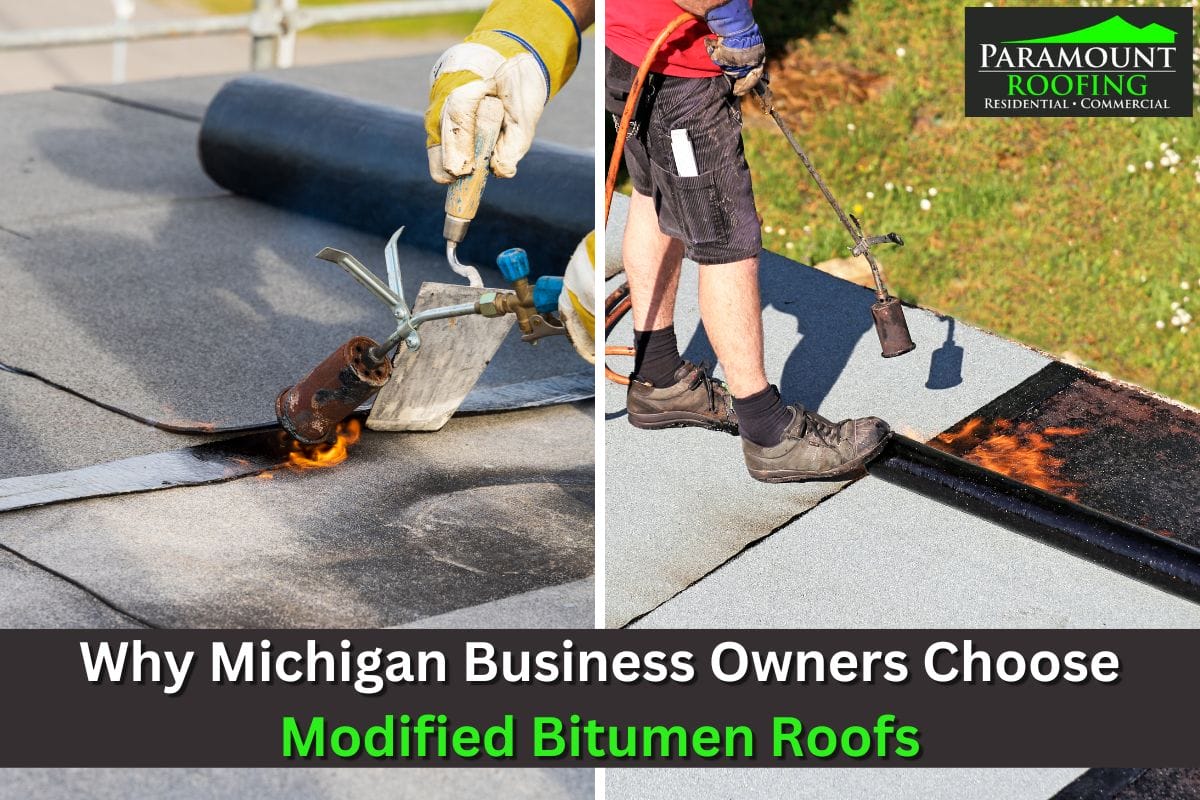The Best Roofing Materials for Apartment Buildings: Durable Options for Property Owners

Choosing the right roofing materials for apartment buildings needs to be a consideration that property owners take into account. The right material can impact the property’s longevity, maintenance needs, and overall value. For apartment building owners in Detroit, where weather conditions can be particularly harsh, selecting appropriate roofing materials becomes even more critical. The ideal roofing solution has to stand up to Michigan’s heavy snowfall, frequent rain, and temperature changes while protecting multiple units.
Apartment buildings have different roofing challenges compared to single-family homes. These multi-unit structures typically feature extensive roof surfaces with minimal pitch, requiring materials specifically designed for flat or low-slope applications. Additionally, the installation or replacement process has to reduce disruptions to tenants, making efficiency and reliability primary concerns.
Energy efficiency also plays a crucial role in apartment roofing decisions. The right materials can substantially reduce heating and cooling costs for the entire building, creating a more comfortable living environment while lowering operational expenses. Weather-resistant options that can withstand Detroit’s diverse climate conditions are important for preventing leaks and extending the roof’s service life.
This comprehensive overview examines the most durable, cost-effective, and energy-efficient roofing materials available for apartment complexes, helping property owners make informed decisions for their commercial apartment roof replacement projects.
Comparing Flat Roof Systems for Multi-Unit Residential Properties
When it comes to apartment buildings in Detroit, selecting the right flat roofing system can mean the difference between years of trouble-free protection and constant maintenance headaches. TPO membranes have gained popularity for their excellent reflectivity, helping to reduce cooling costs during Michigan summers. With a typical lifespan of about 15 to 25 years and strong resistance to UV damage, TPO provides reliable performance in our varying climate conditions.
EPDM rubber roofing offers exceptional durability in Michigan’s freeze-thaw cycles, with installations often lasting about 25 to 35 years when properly maintained. Its simple installation process makes it ideal for large apartment complexes where minimizing tenant disruption is essential.
For urban apartment settings, built-up roofing (BUR) systems deliver outstanding protection against water infiltration through multiple layers of bitumen and reinforcing fabrics. PVC membranes offer superior resistance to ponding water common on flat apartment roofs, along with excellent fire resistance and energy efficiency. Both options give the durability needed for large-scale multi-unit buildings while minimizing long-term maintenance requirements.
Durability Champions: Long-Lasting Roofing Solutions for Apartment Complexes
When managing apartment properties in Detroit, investing in durable roofing materials directly results in lower lifetime costs and fewer tenant disruptions. Metal roofing systems stand out as exceptional performers on apartment buildings. Standing seam metal roofs feature concealed fasteners that prevent leaks and can withstand Michigan’s harsh winters for 20 to 30 years with minimal maintenance. Corrugated metal panels offer similar longevity at a lower price point, while metal tiles combine durability with curb appeal that enhances property value.
Beyond metal options, architectural shingles represent a significant upgrade from conventional asphalt products. These premium shingles feature multiple layers of material, creating dimensional depth while having about a 25 to 30-year lifespan. Their reinforced construction resists Detroit’s freeze-thaw cycles that typically deteriorate lesser materials. Composite roofing, engineered from recycled materials and polymers, delivers impressive impact resistance against Michigan’s occasional hailstorms while maintaining its appearance throughout decades of service.
The performance metrics speak for themselves, and a quality metal roofing system requires virtually no maintenance beyond occasional inspections, while premium architectural shingles and composites drastically reduce the frequency of apartment building roof replacements. For property managers seeking to minimize long-term expenses while maximizing protection, these weather-resistant roofing solutions deliver exceptional return on investment across large-scale residential complexes.
Energy Efficiency and Sustainability in Apartment Roofing
Modern apartment building owners in Detroit are increasingly turning to energy-efficient roofing solutions that reduce environmental impact while lowering costs. Cool roofing systems utilize reflective materials and specialized coatings that decrease heat absorption during Michigan’s summer months. These systems can reduce roof surface temperatures by up to 50 degrees Fahrenheit compared to traditional materials, resulting in decreased cooling demands and potential energy savings of 10% to 15% for apartment buildings.
Several utility companies serving the Detroit area offer rebate programs for property owners who install qualifying energy-efficient roofing systems. These incentives can help offset initial investment costs while accelerating the return on investment through reduced energy bills. When selecting reflective coatings, check for products with high solar reflectance index (SRI) ratings specifically formulated to maintain performance in Michigan’s seasonal climate changes.
Green roofing systems are another option gaining traction for urban apartment buildings. These living roof installations incorporate vegetation layers that provide natural insulation, reducing both heating and cooling requirements throughout the year. Beyond energy benefits, green roofs excel at managing stormwater runoff, which is a significant advantage in Detroit areas prone to high spring, summer, or fall rain. Many apartment owners are transforming previously unused roof spaces into attractive tenant amenities like rooftop gardens and relaxation areas, creating a unique appeal in a competitive rental market while contributing to urban environmental improvement.
Weather-Resistant Options for Michigan’s Challenging Climate
Michigan’s unpredictable weather patterns call for specialized roofing solutions for apartment buildings. Heavy snowfall, ice dams, and rapid temperature swings can quickly deteriorate standard roofing materials, leading to expensive repairs and tenant disruptions. For Detroit apartment owners, investing in weather-resistant roofing isn’t just practical, it’s essential for long-term property protection.
Modified bitumen and EPDM rubber roofing systems excel in Michigan’s freeze-thaw cycles, with superior flexibility that prevents cracking when temperatures plummet. Their waterproofing capabilities create reliable barriers against ice dam formation, a common problem on apartment buildings with inadequate insulation or ventilation. For areas receiving significant snow accumulation, reinforced PVC membranes offer exceptional strength, supporting larger snow loads when properly installed.
Wind resistance becomes particularly important for taller apartment structures throughout Metro Detroit. Architectural shingles with enhanced wind ratings of up to 100 mph provide excellent protection. For apartments with flat roofs, fully-adhered membrane systems significantly outperform mechanically-fastened alternatives in high-wind conditions by eliminating the vulnerability of individual fastening points. Stone ballast systems offer another effective wind-resistant option, using weight distribution to counter uplift forces during severe weather common in southeastern Michigan.
ROI Considerations: Balancing Initial Investment with Long-Term Value
When evaluating roofing options for apartment buildings, Detroit property owners must look beyond upfront costs to understand the true lifetime value of their investment. Higher-quality materials like TPO membranes or metal roofing systems typically have premium pricing initially but deliver significant savings through extended service life and reduced maintenance requirements. A quality TPO installation might last about 25 or more years with minimal upkeep, while more budget-friendly materials could require replacement in just 10 to 15 years, creating disruptive replacement cycles and higher total ownership costs.
The cost becomes more favorable when factoring in energy performance benefits. Reflective roofing can reduce cooling needs by 10% to 30% across large apartment complexes, generating substantial utility savings that accumulate throughout the system’s lifespan. These efficiency gains become especially valuable across Detroit’s seasonal changes, where both heating and cooling demands impact operational budgets significantly.
Warranty protection represents another important ROI factor. Premium roofing systems typically include comprehensive coverage ranging from 20 to 30 years, sometimes with non-prorated terms that maintain full replacement value throughout the warranty period. Insurance considerations also favor quality installations, as many carriers offer reduced premiums for impact-resistant and weather-resistant systems that lower the likelihood of a claim. The most competitive apartment properties in southeastern Michigan maximize their roofing ROI by selecting materials that balance durability, energy efficiency, and comprehensive warranty protection against our region’s challenging weather.
Professional Installation and Maintenance Requirements
Installing and maintaining roofing systems for apartment buildings requires specialized expertise that goes beyond standard residential roofing practices. In Detroit’s multi-unit residential sector, proper installation directly impacts the roof’s performance, longevity, and the comfort of dozens or even hundreds of tenants. Professional installation isn’t just recommended, it’s essential for ensuring warranty coverage and code compliance across large-scale roofing projects.
Experienced Detroit roofing contractors develop detailed staging plans that minimize disruption to tenant parking areas while establishing safe material transport pathways. Project timing becomes important, with work often scheduled during weekday business hours when fewer residents are present. Noise reduction strategies and clear communication protocols help keep positive tenant relations throughout the installation process.
Maintenance requirements vary by roofing material, but typically include professional inspections twice a year, ideally in spring after winter’s harsh conditions and fall before snowfall begins. For flat roof systems common on apartment buildings, drainage maintenance is particularly important in Michigan’s climate. Regular clearing of drains and scuppers prevents water ponding that can damage even the most durable membranes. Professional maintenance plans for apartment complexes should include detailed documentation of all roof conditions, allowing property managers to address minor issues before they escalate into major repair expenses affecting multiple units.
Be Sure Your Apartment Building’s Roof is Top-Notch with Paramount Roofing
If you’re a property manager or owner in Detroit, selecting the best roofing materials for your apartment building is important for long-term durability and tenant satisfaction. Paramount Roofing specializes in providing top-quality roofing solutions made for multi-unit residential properties. We understand the challenges of Michigan’s harsh weather conditions and the unique demands of apartment buildings.
From energy-efficient options like cool roofing to durable materials capable of withstanding heavy snow and wind, our expert team is here to guide you through the best choices for your property.
Ready to discuss your roofing needs? Call us today at (586) 690-0227 and let Paramount Roofing help you with your apartment complex roofing needs.
 Free Estimate
Free Estimate
 Request Service
Request Service Locations
Locations 



